Related Research Articles
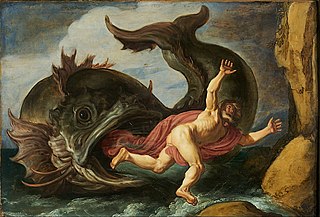
The Book of Jonah is collected as one of the twelve minor prophets of the Nevi'im ("Prophets") in the Hebrew Bible, and as a book in its own right in the Christian Old Testament. The book tells of a Hebrew prophet named Jonah, son of Amittai, who is sent by God to prophesy the destruction of Nineveh, but tries to escape this divine mission.

John 1 is the first chapter in the Gospel of John in the New Testament of the Holy Bible. The author of the book containing this chapter is anonymous, but early Christian tradition uniformly affirmed that John composed this gospel.

The stolen body hypothesis posits that the body of Jesus Christ was stolen from his burial place. His tomb was found empty not because he was resurrected, but because the body had been hidden somewhere else by the apostles or unknown persons. Both the stolen body hypothesis and the debate over it presume the basic historicity of the gospel accounts of the tomb discovery. The stolen body hypothesis finds the idea that the body was not in the tomb plausible – such a claim could be checked if early Christians made it – but considers it more likely that early Christians had been misled into believing the resurrection by the theft of Jesus's body.

John 2 is the second chapter of the Gospel of John in the New Testament of the Christian Bible. It contains the famous stories of the miracle of Jesus turning water into wine and Jesus expelling the money changers from the Temple.

John 5 is the fifth chapter of the Gospel of John of the New Testament of the Christian Bible.

Matthew 28 is the twenty-eighth and final chapter of the Gospel of Matthew in the New Testament. This chapter records that Jesus is risen, describes the actions of the first witnesses to this event, and ends with the Great Commission.
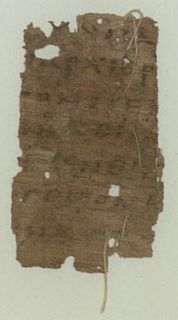
Matthew 27 is the 27th chapter in the Gospel of Matthew, part of the New Testament in the Christian Bible. This chapter contains Matthew's record of the day of the trial, crucifixion and burial of Jesus. Scottish theologian William Robertson Nicoll notes that "the record of this single day is very nearly one-ninth of the whole book".
The Sheep and the Goats or "the Judgement of the Nations" is a pronouncement of Jesus recorded in chapter 25 of the Gospel of Matthew, although unlike most parables it does not purport to relate a story of events happening to other characters. According to Anglican theologian Charles Ellicott, "we commonly speak of the concluding portion of this chapter as the parable of the Sheep and the Goats, but it is obvious from its very beginning that it passes beyond the region of parable into that of divine realities, and that the sheep and goats form only a subordinate and parenthetic illustration". This portion concludes the section of Matthew's Gospel known as the Olivet Discourse and immediately precedes Matthew's account of Jesus' passion and resurrection.
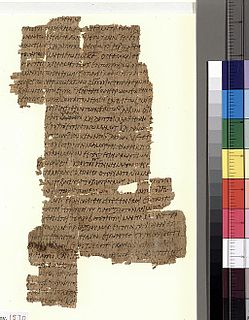
Matthew 26 is the 26th chapter of the Gospel of Matthew, part of the New Testament of the Christian Bible. This chapter covers the beginning of the Passion of Jesus narrative, which continues to Matthew 28; it contains the narratives of the Jewish leaders' plot to kill Jesus, Judas Iscariot's agreement to betray Jesus to Caiphas, the Last Supper with the Twelve Apostles, the Agony in the Garden of Gethsemane and the subsequent vindication of Jesus' predictions.

John 6 is the sixth chapter of the Gospel of John in the New Testament of the Christian Bible. It records Jesus' miracles of feeding the five thousand and walking on water, the Bread of Life Discourse, popular rejection of his teaching and Peter's confession of faith. The final verses anticipate Jesus' betrayal by Judas Iscariot.
John 7 is the seventh chapter of the Gospel of John in the New Testament of the Christian Bible. It recounts Jesus' visit to Jerusalem for the feast of Tabernacles, the possibility of his arrest and debate as to whether he is the Messiah. The author of the book containing this chapter is anonymous, but early Christian tradition uniformly affirmed that John composed this Gospel. Alfred Plummer, in the Cambridge Bible for Schools and Colleges, describes this chapter as "very important for the estimate of the fourth Gospel. In it the scene of the Messianic crisis shifts from Galilee to Jerusalem; and, as we should naturally expect, the crisis itself becomes hotter. The divisions, the doubts, the hopes, the jealousies, and the casuistry of the Jews are vividly portrayed." John 7:1 to 8:59 is sometimes referred to as the "Tabernacles Discourse". Raymond E. Brown describes the Tabernacles Discourse as "a polemic collection of what Jesus said in replies to attacks by the Jewish authorities on his claims".

John 14 is the fourteenth chapter of the Gospel of John in the New Testament of the Christian Bible. It continues Jesus' discussions with His disciples in anticipation of His death and records the promised gift of the Holy Spirit. Jesus speaks individually with Thomas, Philip and Judas. The author of the book containing this chapter is anonymous, but early Christian tradition uniformly believed that John composed this Gospel.
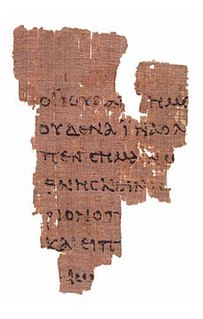
John 18 is the eighteenth chapter of the Gospel of John in the New Testament of the Christian Bible. This chapter records the events on the day of the Crucifixion of Jesus, starting with the arrest of Jesus the evening before. The three denials of Peter are interwoven into the narrative concerning the trials of Jesus.
Matthew 12:39 is the 39th verse in the twelfth chapter of the Gospel of Matthew in the New Testament.

Matthew 7:22 is the twenty-second verse of the seventh chapter of the Gospel of Matthew in the New Testament and is part of the Sermon on the Mount. This verse continues Jesus' warning against false prophets.
Matthew 12:41 is the 41st verse in the twelfth chapter of the Gospel of Matthew in the New Testament.

Acts 1 is the first chapter of the Acts of the Apostles in the New Testament of the Christian Bible. The book containing this chapter is anonymous but early Christian tradition affirmed that Luke composed this book as well as the Gospel of Luke. This chapter functions as a transition from the "former account" with a narrative prelude, repeated record of the ascension of Jesus Christ with more detail and the meeting of Jesus' followers, until before Pentecost.
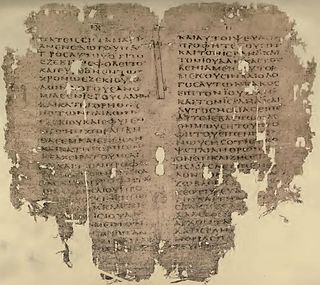
Acts 2 is the second chapter of the Acts of the Apostles in the New Testament of the Christian Bible. The book containing this chapter is anonymous but early Christian tradition affirmed that Luke composed this book as well as the Gospel of Luke. This chapter records the events on the day of Pentecost, about 10 days after the ascension of Jesus Christ.

Romans 15 is the fifteenth chapter of the Epistle to the Romans in the New Testament of the Christian Bible. It is authored by Paul the Apostle, while he was in Corinth in the mid 50s AD, with the help of an amanuensis (secretary), Tertius, who adds his own greeting in Romans 16:22.
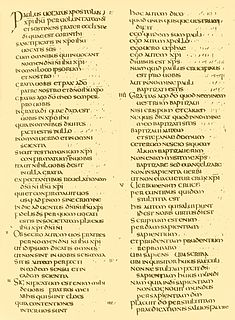
1 Corinthians 1 is the first chapter of the First Epistle to the Corinthians in the New Testament of the Christian Bible. It is authored by Paul the Apostle and Sosthenes in Ephesus, composed between 52–55 CE, and sent to the church in Corinth.
References
- ↑ Greek Text Analysis: Matthew 28:15. Biblehub
- 1 2 Ellicott, C. J. (Ed.) Ellicott's Bible Commentary for English Readers. Matthew 28. London : Cassell and Company, Limited, [1905-1906] Online version: (OCoLC) 929526708. Accessed 28 April 2019.
- ↑ Justin Martyr, Dialogue with Trypo. Quote: Chap. cviii.—The resurrection of Christ did not convert the Jews. But through the whole world they have sent men to accuse Christ. "And though all the men of your nation knew the incidents in the life of Jonah, and though Christ said amongst you that He would give the sign of Jonah, exhorting you to repent of your wicked deeds at least after He rose again from the dead, and to mourn before God as did the Ninevites, in order that your nation and city might not be taken and destroyed, as they have been destroyed; yet you not only have not repented, after you learned that He rose from the dead, but, as I said before,[cf. Chapter xvii.—The Jews sent persons through the whole earth to spread calumnies on Christians.] you have sent chosen and ordained men throughout all the world to proclaim that a godless and lawless heresy had sprung from one Jesus, a Galilæan deceiver, whom we crucified, but his disciples stole him by night from the tomb, where he was laid when unfastened from the cross, and now deceive men by asserting that he has risen from the dead and ascended to heaven."
- 1 2 3 Allison, Jr., Dale C. (2007). "57. Matthew". In Barton, John; Muddiman, John (eds.). The Oxford Bible Commentary (first (paperback) ed.). Oxford University Press. p. 885. ISBN 978-0199277186 . Retrieved February 6, 2019.
- ↑ Carson, D. A. (2017). Matthew. The Expositor's Bible Commentary. Contributors: Tremper Longman III, David E. Garland (revised ed.). 3. First fraudulent denials of Jesus' resurrection (28:11–15): Zondervan Academic. ISBN 9780310531982.
{{cite book}}: CS1 maint: location (link) - ↑ France 2007, p. 1106.